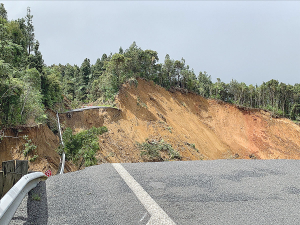Green no more?
OPINION: Your old mate has long dismissed the Greens as wooden bicycle enthusiasts with their heads in the clouds, but it looks like the ‘new Greens’ may actually be hard-nosed pragmatists when it comes to following voters.
 ICNZ chief executive Kris Faafoi says climate adaptation measures can reduce the risks created by storms like Cyclone Gabrielle.
ICNZ chief executive Kris Faafoi says climate adaptation measures can reduce the risks created by storms like Cyclone Gabrielle.
The Insurance Council of New Zealand (ICNZ) is urging the Government to take a leadership role on climate adaptation and build New Zealand’s resilience against the impacts of climate change on lives and property.
The ICNZ presented its submission on the Inquiry into Climate Adaptation to the Finance and Expenditure Select Committee yesterday.
ICNZ chief executive Kris Faafoi says the urgency of the climate crisis cannot be overstated.
“New Zealand’s vulnerability to climate-related hazards, including rising sea levels, coastal erosion, and extreme weather events, requires a clear and coordinated approach which the Government is best placed to lead on,” Faafoi says.
He says the ICNZ supports the development of a national climate adaptation model to guide policy and legislative frameworks and provide long-term clarity and certainty around the country’s response to climate change.
“This strategy aims to bring together central government, councils, the private sector and communities to effectively mitigate risks and ensure sustainable adaptation measures,” Faafoi says.
“We have seen firsthand the impacts of the Auckland Anniversary Weekend and Cyclone Gabrielle events on lives, property, and the economy,” he explains. “By taking a proactive approach, adaptation measures can not only reduce these risks but also contribute to the economy’s security and community resilience.”
Faafoi says ICNZ also backs the development of ambitious adaptation goals and clear outcomes such as a defined level of resilience achieved by 2050.
“The cost of achieving these outcomes should be estimated as much as possible so the funding required for adaptation is well understood,” he adds.
“We acknowledge the investment in climate adaptation is likely to be sizeable and is likely to require funding from a variety of sources, including the private sector, and the development of financial instruments such as resilience bonds.”
Faafoi says a coordinated approach should also consider the Government’s work in related areas such as resource management, housing and fast track approval for infrastructure development to “ensure there is an alignment of objectives and incentives”.
"The time for action is now. By working together, New Zealand can build a resilient and sustainable future for all Kiwis," he concludes.
South Island dairy farmers will soon be able to supply organic milk to Fonterra.
Norwood has announced the opening of a new Tasman dealership at Richmond near Nelson next month.
Buying or building a rural or semi-rural property? Make sure you know where the wastewater goes, says Environment Canterbury.
With collars on more than seven million cows worldwide, Nedap says its standalone launch into New Zealand represents world-leading, reliable and proven smart technology solutions for dairy farmers.
Entries have opened for the 2026 Fieldays Innovation Awards.
Animal welfare is of paramount importance to New Zealand's dairy industry, with consumers increasingly interested in how food is produced, not just the quality of the final product.